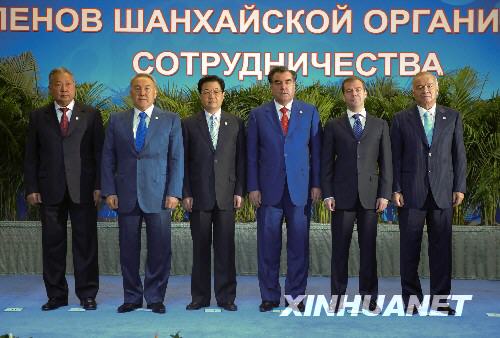Top leaders of the Shanghai Cooperation Organization (SCO) agreed Thursday that any attempt to solve problems by merely resorting to force could not work and would only hinder a comprehensive settlement of local conflicts.
|

|
|
Chinese President Hu Jintao (3rd L) poses for group photos with other leaders of the Shanghai Cooperation Organization (SCO) member states in Dushanbe, capital of Tajikistan, on August 28, 2008, during the annual summit of the organization.
|
A comprehensive solution to existing problems can be found only by taking into account the interests of all parties involved and including them all in the negotiation process rather than isolating any of them, said the leaders in a joint declaration issued at the conclusion of their summit in the Tajik capital.
Any attempt to strengthen a country's own security at the expense of that of others is detrimental to maintaining global security and stability, they said.
On the issue of South Ossetia, the SCO members expressed their deep worries over the tense situation triggered by the South Ossetia conflict, and called on relevant parties to solve existing problems peacefully through dialogue, strive for reconciliation and push for negotiations.
The SCO leaders welcomed the six-point proposal on solving the conflict which was reached in Moscow on August 12, expressing their support for Russia's positive role in promoting peace and cooperation in the region.
On the prevention of conflicts, the leaders pledged to abide by the UN Charter and relevant UN Security Council resolutions and basic norms governing international law in the process.
The UN Security Council, which is entrusted with the major responsibility of safeguarding world peace and security, should play a leading role in this regard, they said.
The declaration was signed by Chinese President Hu Jintao, Russian President Dmitry Medvedev, Kazakh President Nursultan Nazarbayev, Kyrgyz President Kurmanbek Bakiyev, Tajik President Emomali Rakhmon and Uzbek President Islam Karimov.